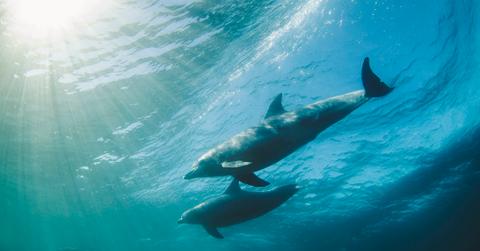French Beach Covered With Mangled Dolphin Corpses, As a Side Effect of the Fishing Industry
Hundreds of dolphin bodies keep washing up.
Mar. 21 2019, Updated 2:31 p.m. ET

In the world of commercial fishing, the fish on your plate aren't the only casualties. All sorts of marine animals, including dolphins, whales, sea turtles, and sharks also get killed or injured by fishing nets during the trawling process, rendering them as "bycatch." And unfortunately, earlier this month, a pile of dead disfigured dolphins were found washed up on the shore of a French beach.
As reported by The Independent, the dolphins were discovered by the French chapter of Sea Shepherd, an international ocean conservation organization. Sea Shepherd shared a blog post on its website detailing the team's findings. At a beach along France’s Atlantic Coast, Sea Shepherd's on-shore team has came across more than one stockpile of mutilated dolphin corpses over the past few months. Since December, the team has found around 700 dead dolphins washed up on the beach. Sea Shepherd estimates that every year, at least 6,000 dolphins are killed along France's west coast, as bycatch from the fishing industry.
Sea Shepherd France shared the following photo of one of the recent dolphin stockpiles with Green Matters.

It's important to note that these dolphins did not make their way to the shore and then peacefully pass away — unfortunately, it's quite the opposite. According to The Independent, in the fishing industry, the process of trawling (pulling a large fishing net through the water to catch fish) often results in dolphins as bycatch. If the dolphins do not die from drowning upon being removed from the water, fishermen sometimes slice dolphins open and throw them back into the water, so that they "sink and disappear," The Independent explained.
“They cut their fins and tail to remove them from the nets in order not to damage the nets,” Lamya Essemlali, president of Sea Shepherd France, told The Dodo in February 2018. “Nets are very expensive. They prevail over the life of dolphins.” As long as this practice continues, mutilated dolphins will keep washing up on France's beaches. Sea Shepherd France even has an initiative called Operation Dolphin ByCatch, which aims to raise awareness for the dolphins killed in the fishing industry.
So, what happens to the dolphin bodies that consistently wash up on France's beaches? According to The Independent, once a week, local authorities collect the carcasses and send them to a rendering plant. Rendering is the process of grounding and heating the bodies of inedible animals and inedible animal parts into new fat and protein products, as explained by the National Renderers Association. The association added that most products that come out of rendering plants become animal feed for the animal agriculture industry, fish feed for the aquaculture industry, and pet food.
According to the World Wildlife Foundation (WWF), bycatch is the largest cause of death for small cetaceans, which include dolphins, small whales, and porpoises. The WWF asserts that to change that statistic, there needs to be a greater focus on bycatch reduction practices, and the organization is working with the fishing industry on new technology and nets to accomplish that.
If you want to help reduce the bycatch and cruel practices of the commercial fishing industry, where one out of every three fish caught goes to waste, and where overfishing is causing fish populations to decline, there are a few things you can do. For example, you can donate to organizations fighting these practices, such as Sea Shepherd Global, and you can reduce your funding of the fishing industry by eating less fish.